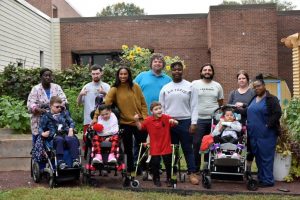Overbrook School Plants More than Seeds
Overbrook School for the Blind
Philadelphia, Pennsylvania
Overbrook School for the Blind is doing more than just planting seeds in their school garden—they’re growing lifelong learners with a passion for being healthy and trying new foods. With the help of a Game On grant from Action for Healthy Kids, Overbrook has been able to grow and improve the school gardens that serve their students. The additional funding has allowed staff at Overbrook to make the garden a more inclusive environment where all 188 students, ranging from 3 to 21 years old with visual impairments and ranges of abilities, can actively participate and learn.
 The idea of a garden on campus began five years ago when staff and students were developing a plan around the idea of “Let’s Get Healthy.” The garden started as a small project, intended to allow students to just try new fruits and veggies, but the project has grown immensely—in both passion and size—into an incredible horticultural center. Lee Stough, a teacher at Overbrook, highlights Action for Healthy Kids as a catalyst for their growth: “With the AFHK funds, we added two trellises with raised beds in the Biddle garden that grow vine plants for students in wheelchairs to tactually explore. The grant has had a ripple effect on the garden; we were awarded a Blue Ribbon award from the Pennsylvania Horticultural Society’s (PHS) Greener Garden Contest, and we won PHS’s inaugural Popular Vote contest. We also increased our food yield from 176 pounds in 2018 to 410 pounds in 2019. We couldn’t be more grateful for AFHK’s support.”
The idea of a garden on campus began five years ago when staff and students were developing a plan around the idea of “Let’s Get Healthy.” The garden started as a small project, intended to allow students to just try new fruits and veggies, but the project has grown immensely—in both passion and size—into an incredible horticultural center. Lee Stough, a teacher at Overbrook, highlights Action for Healthy Kids as a catalyst for their growth: “With the AFHK funds, we added two trellises with raised beds in the Biddle garden that grow vine plants for students in wheelchairs to tactually explore. The grant has had a ripple effect on the garden; we were awarded a Blue Ribbon award from the Pennsylvania Horticultural Society’s (PHS) Greener Garden Contest, and we won PHS’s inaugural Popular Vote contest. We also increased our food yield from 176 pounds in 2018 to 410 pounds in 2019. We couldn’t be more grateful for AFHK’s support.”
The staff’s goal is to expose the students to new fruits and vegetables, but the benefits of the garden have extended well beyond just supplying products for monthly taste tests. Students are studying plants and caring for them on a daily basis. The students start their seeds in the classrooms and take up any available sunny window space in the building to grow their seedlings. Once the plants have matured, the students are responsible for planting the seedlings, watering them and taking them in and out of the building on a daily basis.
High school-aged students (14-18) and school-to-work-aged students (18-21) are also actively involved in the garden by taking part on a Student Nutrition Committee. This committee is the driving force behind health initiatives taking place on the Overbook School campus. They are responsible for organizing the monthly taste tests and expanding the school’s programming involving the garden. For the month of March (National Nutrition Month), the students have created a video around the theme “Eat Well, Live Longer.” This video, in which they interview students and staff on their wellness ideas and activity preferences, is a snapshot intended to capture the health and wellness initiatives at Overbook. The students on the Student Nutrition Committee are also using the school garden data to perform outcome studies on how effective the taste tests are and to determine if they are creating change in the community. Not only does the Student Nutrition Committee plan and organize most of the wellness happenings at Overbrook, they’re also excellent advocates amongst their peers, often reminding their friends and school staff that it’s important to be exposed to a new food 15 times before deciding whether or not you like it!
The reach of Overbrook’s school garden has extended well beyond the school’s walls. Many times, the additional produce goes home to families or is shared in the community. During prime growing season, students hold a produce sale at the school which also serves as career training because they’re handling money, counting change and practicing their customer service skills. Other leftover produce is picked, cleaned, bagged and delivered weekly to a local food pantry by the students; this year alone they’ve donated over 150 pounds of produce! We can’t wait to see what great ideas Overbrook School “plants” next for their school garden.
This grant was made possible with funding from Cargill.